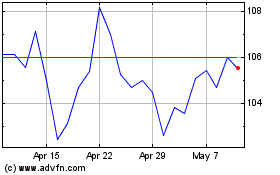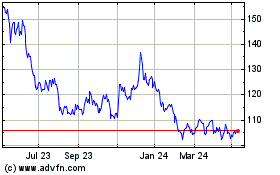By Simon Zekaria
LONDON-- BT Group PLC on Thursday said it is spending billions
of dollars on upgrading the U.K.'s high-speed Internet broadband
and wireless networks as well as slashing costs of its recently
relaunched mobile business, as the telecommunications firm's
quarterly profit rose.
The U.K. telecoms incumbent said it is spending GBP6 billion
($8.7 billion) over the next three years on superfast fiber-optic
broadband and fourth-generation wireless coverage. One key measure
is increasing fiber running to premises directly, which offer
higher speeds than lines routed through older copper telecoms
networks. BT previously said it considered the technology too
expensive to roll out on a mass scale.
The plan comes amid pressure from industry regulators and the
U.K. government on the London-based firm to dial up telecoms
investment and sustain the country's economic recovery.
And BT's spending follows wider criticism over the reach of its
operations as the U.K.'s largest fixed telecoms firm, which
resulted in calls from rivals for BT's lucrative infrastructure arm
to be separated from the main company. Rival operators lease the
network, which covers large parts of the country.
Sky PLC, Europe's biggest pay-television group by customer
numbers, called BT's plans "limited" and said they had been
"dragged out" of the company by the threat of regulatory
action.
"We are happy to accept criticism. We are happy to step up, " BT
Chief Executive Gavin Patterson told reporters following the
results.
To partially fund its spending ramp-up, BT is taking out
costs.
BT expects savings of around GBP400 million a year in the fourth
year of integration of mobile business EE, up from a previous
target of GBP360 million. It also expects the cost of integrating
the mobile company-- which it acquired last year--to be lower than
previously planned, at around GBP550 million.
Over the next two years, across the group, it said it expects
overall to take out over GBP1 billion in gross costs.
BT said net profit in the final fiscal quarter ended March 31
rose to GBP756 million from GBP690 million for the same period a
year earlier, boosted by demand for broadband and television
services. Revenue before exceptional items rose 22% to GBP5.66
billion.
Fiscal-year earnings before interest, taxes, depreciation and
amortization, adjusted for exceptional items, was GBP6.58 billion,
up 5%. The company expected "modest growth" in adjusted Ebitda in
fiscal 2016.
In the year, sales for its consumer division increased 7% and
the number of customers for its TV service jumped by 28%.
BT shares rose near 3% in midmorning trade. "The significant
investment in networks will go somewhere to appease regulators,"
said CCS Insight analyst Paolo Pescatore.
Earlier this week, The Wall Street Journal reported that the
European Commission is set to block CK Hutchison Holdings Ltd.'s
planned deal to buy British mobile operator O2 for around $14
billion.
EU competition commissioner Margrethe Vestager has taken a tough
stance against telecoms mergers in the region, particularly in
cases where deals reduce the number of mobile-telecom operators in
a given country to three from four, as would be the case in the
U.K. deal.
And in the U.K., both the antitrust body, U.K.'s Competition and
Markets Authority, and communications regulator U.K.'s Office of
Communications, or Ofcom, have voiced concerns about the deal,
saying it would hurt competition and lead to higher consumer
prices.
Thursday, Mr. Patterson said: "It is clearly a factor in the
market," on the merger.
But he said regulatory resistance wouldn't deter fixed-operators
from seeking deals in the U.K.
"Even if there isn't a four-to-three consolidation, I think the
opportunities for other fixed players to combine with one or other
of the two mobile operators, [Three] and O2--those exist.
Consolidation within a convergence landscape I think it going to
continue."
In the U.K, as elsewhere in Europe's consolidating telecoms and
cable markets, operators are battling for subscribers in an
intensified media services fight as they bundle together fixed
telephony, mobile, broadband Internet and pay-TV.
BT has spent heavily on a range of sports channels and sports
rights, including high-profile domestic and European soccer, to
develop its TV service and in February 2015 moved to acquire mobile
operator EE in a multibillion-dollar deal, which has raised the
stakes in the industry.
BT recommended a full-year dividend of 14 pence, up 13%.
Write to Simon Zekaria at simon.zekaria@wsj.com
(END) Dow Jones Newswires
May 05, 2016 07:09 ET (11:09 GMT)
Copyright (c) 2016 Dow Jones & Company, Inc.
Bt (LSE:BT.A)
Historical Stock Chart
From Mar 2024 to Apr 2024

Bt (LSE:BT.A)
Historical Stock Chart
From Apr 2023 to Apr 2024
